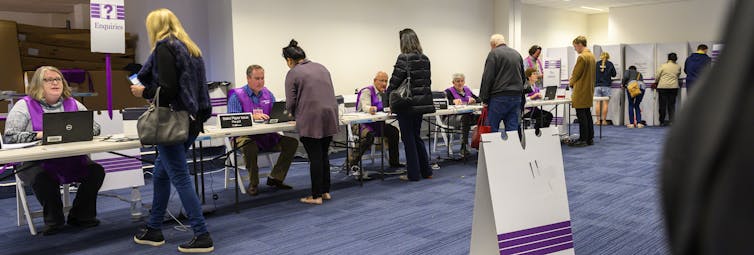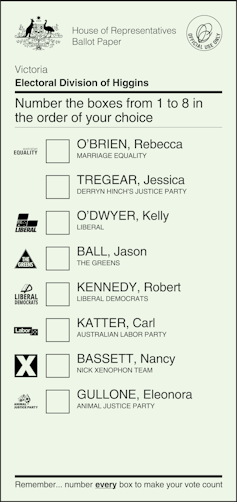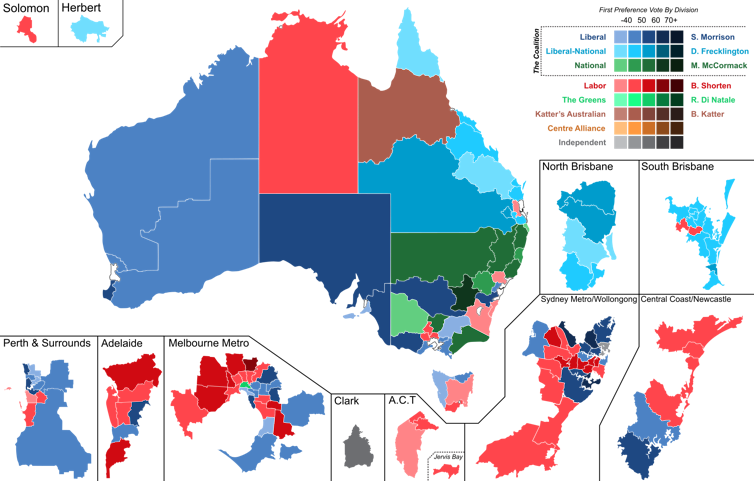
Experts in autocracies have pointed out that it is, unfortunately, easy to slip into normalizing the tyrant, hence it is important to hang on to outrage. These incidents which seem to call for the efforts of the Greek Furies (Erinyes) to come and deal with them will, I hope, help with that. As a reminder, though no one really knows how many there were supposed to be, the three names we have are Alecto, Megaera, and Tisiphone. These roughly translate as “unceasing,” “grudging,” and “vengeful destruction.”
Last weekend, it seemed that every time I turned around Australia was being brought to my attention in some way. I told Lona about it, and she said perhaps Australia was trying to tell me something. I think she’s right … and I think it was this article I had been holding for a while. It must be time.
==================================================================
What US election officials could learn from Australia about boosting voter turnout

Australian Electoral Commission
Steven Mulroy, University of Memphis
Not every country is plagued by rules that limit voters’ participation in elections, as is common in the United States.
In the past five years, restrictions on voting and voter registration purges have limited the number of Americans eligible to cast ballots.
In addition, the U.S. is the only major democracy that still allows politicians to draw their own district lines, an often-criticized conflict of interest in which public officials essentially pick their voters, rather than the voters picking their officials. That computer-aided gerrymandering of electoral districts reduces the number of districts with competitive races, contributing to low voter turnout.
Perhaps the fundamental problem, though, is that the system yields results the people don’t actually want. Twice in the last two decades, U.S. voters chose a president, George W. Bush and Donald Trump, who got fewer votes than his rival, Al Gore and Hillary Clinton.
All these problems are avoidable and don’t happen in countries that have different voting laws. Perhaps the best example is Australia, a country which is culturally, demographically and socioeconomically similar to the U.S. In my book “Rethinking U.S. Election Law,” written while I lived and studied their system Down Under, I outline many of the ways Australia has solved voting quandaries that persist in the U.S.
Mandatory voting, made easy

Screenshot from Royal Bank of Australia, CC BY-ND
Australia’s most strikingly different law requires voting. All Australians must register to vote and actually cast a ballot. Not voting means a small fine (AU$20, or about US$14) will be imposed.
Australians don’t have to actually vote for a candidate: They can leave it blank, write in “none of the above” or even draw a picture – but they do have to turn in a ballot. As a result, Australia enjoys voter registration and turnout rates over 90%.
Voting is easier in Australia than in the U.S.. All voters can cast their ballots by mail, vote in person ahead of Election Day or show up to the polls on Election Day itself – which is always on a Saturday, when most people are off from work.
A different way of counting

Hshook/Wikimedia Commons, CC BY-SA
Australia’s vote-counting rules are also different in important ways.
For its House elections, Australia uses what is called “preferential voting,” a form of ranked-choice voting.
Voters are allowed to rank their candidates in order of preference – 1st, 2nd, 3rd and so on. If a candidate’s first-choice votes add up to a majority of the overall ballots cast, that candidate wins, just like in any other system.
If no one wins a majority of the votes cast, the candidate with the fewest first-choice votes is eliminated and their supporters’ votes are redistributed according to these voters’ second choices. This process of eliminating candidates and redistributing those candidates’ supporters continues until one candidate has a majority.
This system eliminates what is at times called the “spoiler” problem in U.S. elections, where too many similar candidates split the majority’s vote, allowing a less-preferred candidate to win with a minority of the votes cast. For instance, in 2000, people could have voted for Ralph Nader while also showing that they would have preferred either of the other two candidates for president, Al Gore or George W. Bush.
Independent redistricting
Even with ranked-choice voting, any system where a single representative is elected for each district is vulnerable to gerrymandering. The lines can be drawn to give one party more seats than its mathematical vote share warrants.
To reduce that problem, Australia’s election districts are drawn by the Australian Electoral Commission, a politically independent commission of nonpartisan technical experts.
It’s well respected for being nonpartisan, with a good track record of keeping politics out of the redistricting process.
But even the Australian Electoral Commission isn’t perfect. As I detail in my book, like-minded people naturally cluster together in communities. That creates what some scholars have called “unintentional gerrymandering.” In the U.S., for example, Democratic voters overconcentrated in urban areas are unavoidably consolidated into districts with large Democratic supermajorities. That partially explains why, until recently, Republicans controlled the Virginia state legislature for years, even as Democrats won all the statewide and presidential elections.

Erinthecute/Wikimedia Commons, CC BY-SA
Proportional representation
One way to fix the problem of gerrymandering – whether intentional or otherwise – is to move away from the concept of “winner-take-all” elections, in which 51% of the votes yields 100% of the power. In that system, significant minority voting blocs end up with no representation, leading to frustration and alienation.
For legislative elections, one potential solution could be proportional representation, in which a party earning 30% of the vote receives approximately 30% of the seats available. Rather than “winner take all,” this is “majority takes most, and minorities take their fair share.”
Proportional representation systems don’t have single-member districts, like having one congressperson per congressional district. Rather, representatives are elected either at-large or in multi-member districts. With districting eliminated, gerrymandering becomes impossible. Australia uses this system for its Senate, using a different form of ranked-choice voting called the single transferable vote.
Like the single-winner ranked-choice voting used in Australia’s House, if no candidate wins enough first-place votes to get a seat, weaker candidates are eliminated and their votes transferred to others based on second and third choices. But single transferable vote systems also reallocate what might be called “surplus” votes of winning candidates – extra votes beyond what candidates need to actually win – to ensure a more proportionate result.
Proportional representation allows third parties to thrive, giving voters more choices. Australia offers a natural experiment between methods: For the last half-century, Australian voters nationwide have chosen single-member House representatives and used proportional representation to elect its Senate.
The result is that the Green Party consistently gets about 10% of the national vote, but zero seats in the House. However, in the Senate it gets about 10% of the seats, giving it a voice in the legislative debate. The difference is the move from winner-take-all in the House to proportional representation in the Senate. In addition, major parties vie to get second-choice support from Green Party backers, so the Greens’ concerns have real influence over national policies.
All these ideas – voting by mail, early voting, Saturday voting, ranked-choice voting, an independent redistricting commission and proportional representation – make Australia’s democracy more inclusive and representative than in the U.S.
[ You’re smart and curious about the world. So are The Conversation’s authors and editors. You can read us daily by subscribing to our newsletter. ]![]()
Steven Mulroy, Law Professor in Constitutional Law, Criminal Law, Election Law, University of Memphis
This article is republished from The Conversation under a Creative Commons license. Read the original article.
==================================================================
Of course, just at the moment, it isn’t actual physical turnout that we want. But we do want participation, and plenty of it. One thing that some of us are pushing it for the Federal Government to require all states to provide some form of voting by mail. Here is Colorado, as in Oregon and Washington, we had no idea we were preparing for a pandemic – we just thought we were improving participation and providing better service to all our citizens (and especially the disabled). But lo, here we are. There’s a petition here – I’m not familiar with the site, but Jeff Merkley is a co-sponsor – that has to count for something. There’s one here, sponsored by Daily Kos. This one is from the “Stop Republicans” PAC (they ask, but it’s not necessary to donate to sign.) There are probably others – please share them if you see them.
Alecto, Megaera, and Tisiphone, I don’t know whether it is even possible to get voting by mail to be at least an option in all states. But please help us try. And don’t let us forget all the other ideas from OZ when – I’ll say when – we return to what passes for normal.
The Furies and I will be back.
17 Responses to “Everyday Erinyes #209”
Sorry, the comment form is closed at this time.

The United States could learn a lot from “Down Under”! Australia may have its problems, but you can’t blame them on their voting system.
Class was in session on this lesson today, with lots of info to contain too.
Great post, and information re: our Down Under neighbors.
Signed petitions, and am also saving this, and also sharing w/friends and family.
Thank you, Joanne and Furies for this educational info.
I’ve always felt that voting should be mandatory with a fine imposed for not voting without a valid reason.
I’d like to see a sliding fine system, though. Otherwise it becomes a poll tax in reverse.
Wonderful examination of the issues of representation and voice related to different election methods Joanne–thank you.
I got my census invitation this week. Am only checking the mail twice a week. It took five minutes. I really hope people comply and that those without online access are found and counted.
It IS time we got onboard with voting other than by standing in line, Australia has done a fine job with that. One of the concerns I’ve seen raised is that Trump and his party might try to delay the election. I don’t think they’ll get away with that but the virus might well interfere. The nonsense we’ve heard so far is just that. There are NO cures. The anti malarial drug may be helpful, but it only works if you HAVE the virus. There’s no vaccine and couldn’t possibly be one in less than 18 months or so. The Spanish flu, the most recent example we have of something this large, went dormant over the summer months (Trump has mentioned this) but came roaring back in the fall and killed more people then than in its first iteration. What we are facing now is not going to go away, though it may slow in the summer.
I watched a video Italian Hospital Crisis that demonstrates just how bad things are going to get. They had 627 more deaths yesterday. Iran may be worse. I saw a graphic on our situation on MSNBC in which an epidemiologist said we can expect the numbers to double every two to three days. We are SO unprepared for anything like this. Trump is incapable of handling this.
The self-isolating we are doing may flatten the curve, that’s our only real hope because there just isn’t enough hospital space, nor medical supplies to handle an explosion of cases. Then, you’ve got the young fools, several videos online of them stating they don’t care, it won’t hurt them, spring break on the beach is more important and the governor of Florida agreeing with them, in essence anyway by refusing to do anything.
Stay safe everyone. This is going to be a long process worldwide. America is less prepared than most nations. Trump’s idea of preparation is lies and trying to deflect his administration’s failure by calling this the Chinese virus as if where it originated mattered at all. Oh, and trying to shift blame to Obama. Many of us here are in the wrong demographic for this. A friend of my oldest son, whose been gone nearly ten years now, had invited me to the Eagles concert scheduled for April 3 at the Excel Energy Center in St. Paul – those kids loved the Eagles as much as I did and were exposed to them a LOT growing up. Even if they lift the stay home suggestion, I don’t think crowds are a place I should be right now or any time soon. My granddaughter is going to miss prom, likely her graduation and more. I feel for those kids. All the while our leadership is fiddling while the nations burns.
Nice to see you here!
Enjoyed reading your comment, to which I can’t add one thing…..well said to all.
We’re all in this together. You stay safe too, as well as your family.
Thanks, Gene.
Ditto to Pat. Although I might add that COVID-19 has hit Iran pretty hard, and Iran isn’t exactly chilly (And neither is Australia right now, and they are concerned.)
Great comment, Gene.
I agree with you 100% regarding your comment that the U.S. is way behind thanks to our corrupt leader. He loves braining/ pointing fingers at others, never taking responsibility.
Like Pat stated, We are all in this together and I pray for us all to be safe, stay calm. We shall all make it through this stressful time.
A lot of their policies make sense, but if an aussie votes by drawing a picture of as ass hole, is that a vote for the Tories?
Hello, again, Gene!!
Exclusive: The American political system, despite all the nice sentimentality bout voting’s importance, does not want everyone to vote. The GOPIGGIES, certainly do not want it.
Why did Pres. Obama not rally the troops around getting rid of the electoral college, after the G.W.Bush debacle? I wish I knew. An assumption that such a thing was rare? I think he’s smarter than to rely on that. Mitch McGrim Reaper? We did not have a gangsta gov’t yet.
I really like the Australian voting process. If it wasn’t clear by now, the prevailing thought is that the U.S. seems to think that every process that is developed or created by the U.S. is the absolute best solution, regardless of the very and easily produced examples. Even though, such advanced processes such as this, and health care for every resident, just to illustrate two processes, is so offensive to the political heads and their henchmen that they will never allow for the advancement of the U.S. We are so far from where we were, as far as being respected in the world’s countries.
The damage that this, Impeached President, has inflicted is going to take several decades before there is advancement from this nadir.
I have said this before, I weep for my son and the world around him and for my country.
Welcome, James, and thanks for your first comment! Now that you have commented, your comments will be automatically approved as long as the information is exactly the same. Should change a letter accidentally and hive one go to moderation, don’t fret – one of us will be along to approve it. Don’t be a stranger!
Welcome James.
Unlike many Yanks, I consider the US plurality based election standard to be among the world’s worst. It condemns people, who vote for third party candidates to supporting the main party candidate whose policies are most opposite to theirs. Most Democrats want to change it. Virtually all Republicans want to keep it the way it is.
Come back soon!
The Oz folks have some wonderful ideas.
But I share your concern WRT the ~$14 fine for not voting. For quite a few folks that would be a stiff penalty.
For Trump and Sen. Richard “Insider-Trading” Barr, it would be pocket change.
My thought exactly – and I could name a few others.
It does say “without a good reason.” Personally I would think because some Simon Legree made you work through election day without notice would be a good reason. But I’d want to see that clearly codified
And I’d even more like to see things like early voting and voting by mail. I’d prefer the participation to the money.
I like the way they make it mandatory to vote in Australia. I feel that the U.S. should follow their ways.
Great post. Thanks Joanne